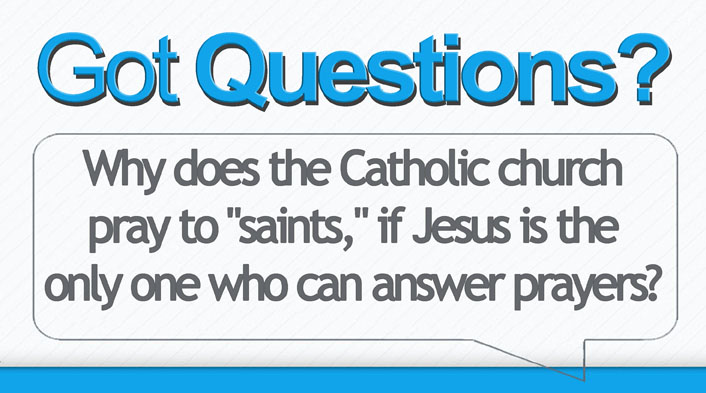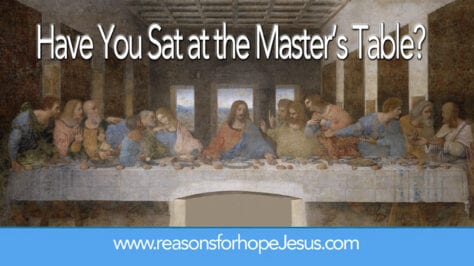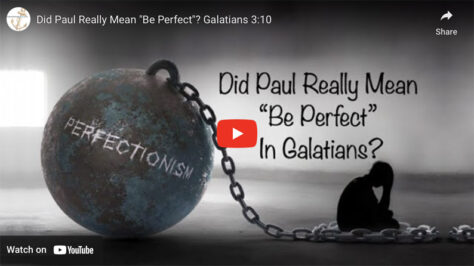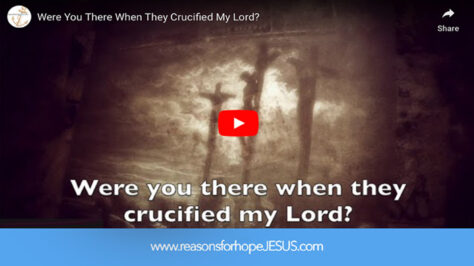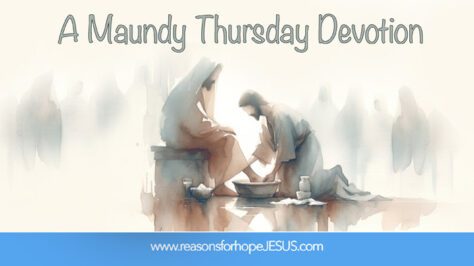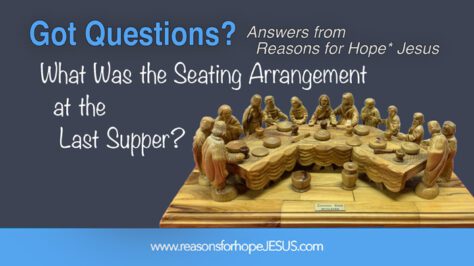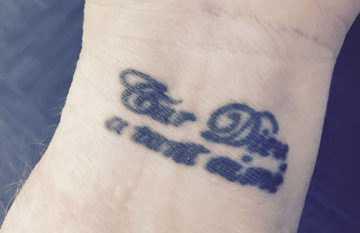The Catholic church believes saints (those who have been given sainthood by the Catholic church) hear prayers and are able to be an intercessor and present prayers to God. To discern whether this is biblical, let’s look at some reasons the Catholic church offers to support this practice. Then I’ll provide scriptural responses.
Saints as Intercessors
From catholic.com
Can They Hear Us? One charge made against it [praying to saints] is that the saints in heaven cannot even hear our prayers, making it useless to ask for their intercession. However, this is not true. As Scripture indicates, those in heaven are aware of the prayers of those on earth. This can be seen, for example, in Revelation 5:8, where John depicts the saints in heaven offering our prayers to God under the form of “golden bowls full of incense, which are the prayers of the saints.” But if the saints in heaven are offering our prayers to God, then they must be aware of our prayers. They are aware of our petitions and present them to God by interceding for us.
Response: The verse used to support praying to saints (Revelation 5:8) does not support that practice. The verse is a picture of what John saw in heaven—the 24 elders holding golden bowls containing the prayers of the saints:
Revelation 5:8 Now when He had taken the scroll, the four living creatures and the twenty-four elders fell down before the Lamb, each having a harp, and golden bowls full of incense, which are the prayers of the saints.
This verse does not say they are “interceding for us.” Nor does it say that they are “offering our prayers to God.” It does not even say that the 24 elders heard these prayers. It simply says they have “golden bowls full of incense, which are the prayers of the saints.” We cannot make that verse say more than what it does. This verse does raise another question. Are these the prayers that are currently being prayed? Or, do these “bowls” contain all the prayers ever prayed to the Father? We do not know. Additionally, if this is used to support praying to saints, it raises more questions. If the 24 elders are Catholic saints, which 24 saints are they? This cannot be thought to be representative of all the saints in Heaven. That’s just adding more extra-biblical thought that is not supported anywhere in Scripture.
Saints as Mediators
From catholic.com [bracketed information, mine]
One Mediator: Another charge commonly leveled against asking the saints for their intercession is that this violates the sole mediatorship of Christ, which Paul discusses: “For there is one God, and there is one mediator between God and men, the man Christ Jesus” (1 Timothy 2:5).
But asking one person to pray for you in no way violates Christ’s mediatorship, as can be seen from considering the way in which Christ is a mediator. First, Christ is a unique mediator between man and God because he is the only person who is both God and man. He is the only bridge between the two, the only God-man. But that role as mediator is not compromised in the least by the fact that others intercede for us. [No Scripture is provided to support that statement.]
Furthermore, Christ is a unique mediator between God and man because he is the Mediator of the New Covenant (Heb. 9:15, 12:24), just as Moses was the mediator (Greek mesitas) of the Old Covenant (Gal. 3:19–20).
Response: The Scripture is clear there is only one Mediator and He is Christ. There is a huge difference between asking a living brother or sister in Christ to pray to God on our behalf and asking a dead person to be a mediator before God on our behalf. The living person will approach the throne of grace through Christ. The dead saint is being asked to approach the throne of grace as a mediator.
This can be understood by the distinction between the vertical and horizontal relationships which are ours through the cross of Christ. The vertical relationship with God was given to us by Jesus, when we repented and trusted in Him. We did nothing to earn this. Jesus did everything to give it to us. Because we have been given the righteousness of Christ ( 2 Corinthians 5:21), we are able to “come boldly unto the throne of grace, that we may obtain mercy, and find grace to help in time of need.” (Hebrews 4:16) Our direct access to God the Father is grounded in our vertical relationship with Him—made possible through Jesus.
When we ask a brother or sister in Christ to pray for us, we are exercising our horizontal relationship with other believers who also have received the vertical relationship with God the Father through Jesus Christ. They will also pray directly to the Father, interceding on our behalf, by coming boldly before the throne through the Son.
Additionally, the idea that a dead saint can be a mediator is not supported by the claim that Moses was a mediator. Moses was alive when He acted as a mediator between the people of Israel and God. There is no suggestion that the people or the leaders prayed to him, seeking him to act as a mediator, after his death.
The Cross Connects Heaven and Earth
Praying to any soul in Heaven, for the purpose of intercession before the Father, is a misunderstanding of the vertical relationship we have been given.
Think of the image of the cross. The vertical beam of that cross was anchored in the earth (the world). The cross is also referred to in Scripture as a “tree” (Acts 5:30, 10:39, 13:29, 1 Peter 2:25). Trees are rooted in the earth (the world). The vertical beam of the cross extended from the earth, upward into the sky, and at Jesus’ head (atop the cross) was an inscription that proclaimed Him to be the Messiah, the King of the Jews. It also proclaimed Him to be God! (See “Did Pilate unknowingly proclaim Jesus to be God?” Question 26, page 173) The vertical beam of the cross is emblematic of our vertical relationship with God. It is personal, individual and through Jesus it is direct.
From catholic.com
The intercession of fellow Christians—which is what the saints in heaven are—also clearly does not interfere with Christ’s unique mediatorship because in the four verses immediately preceding 1 Timothy 2:5, Paul says that Christians should intercede: “First of all, then, I urge that supplications, prayers, intercessions, and thanksgivings be made for all men, for kings and all who are in high positions, that we may lead a quiet and peaceable life, godly and respectful in every way. This is good, and pleasing to God our Savior, who desires all men to be saved and to come to the knowledge of the truth” (1 Tim. 2:1–4). Clearly, then, intercessory prayers offered by Christians on behalf of others is something “good and pleasing to God,” not something infringing on Christ’s role as mediator.
Response: Paul is speaking about Christians who are alive on this earth and intercede by praying to the Father through the Son. These verses do not support praying to dead saints in Heaven to have them go to God directly. The statement, “fellow Christians—which is what the saints in heaven are” is wrong. Paul writes repeatedly in his letters to the churches that those who are “in Christ” are saints. He’s speaking about those who are alive and he’s clear they are our “fellow Christians.” Those in Heaven are not “in Christ,” they are with Christ. There is a difference!
From catholic.com [bracketed information, mine]
“No Contact with the dead” Sometimes Fundamentalists object to asking our fellow Christians in heaven [again, calling dead people “fellow Christians”] to pray for us by declaring that God has forbidden contact with the dead in passages such as Deuteronomy 18:10–11. In fact, he has not, because he at times has given it—for example, when he had Moses and Elijah appear with Christ to the disciples on the Mount of Transfiguration (Matt. 17:3).
Response: This is a poor example. The vision that Peter, James and John saw was simply that, a vision, and did not include any prayers offered to Moses and Elijah in the hope of their interceding. Note that Scripture tells us Peter addressed Jesus, who was “transfigured before them,” not Moses or Elijah who were physically dead. Matthew 17:3 says that Moses and Elijah were talking with Jesus, but it does not say they were offering any prayers. This vision was not a vision of the throne of grace. At that time Moses and Elijah would have been in Abraham’s Bosom in the heart of the earth, the abode of the righteous dead prior to Christ’s resurrection. (For information on Abraham’s Bosom, see “How can we know what Heaven is like?” Got Questions? Reasons Book 2, Question 17.)
A Deceased Relative as an Intercessor
From catholic.com [bracketed information, mine]
What God has forbidden is necromantic practice of conjuring up spirits. (Deuteronomy 18:10–15). God thus indicates that one is not to conjure the dead for purposes of gaining information; one is to look to God’s prophets instead. Thus one is not to hold a seance. But anyone with an ounce of common sense can discern the vast qualitative difference between holding a seance to have the dead speak through you and a son humbly saying at his mother’s grave, “Mom, please pray to Jesus for me; I’m having a real problem right now.” The difference between the two is the difference between night and day. One is an occult practice bent on getting secret information; the other is a humble request for a loved one to pray to God on one’s behalf.
Response: It is correct that the verses cited in Deuteronomy teach against “conjuring up spirits,” but that does not give justification to praying to the dead. The support for praying to the dead is from man’s reasoning and lacks biblical support. While someone might be comforted talking to a deceased loved one, like the example of a son praying to his mother, it raises more questions. Does the deceased person hear the prayer and do they have the ability (or the right standing) to intercede on our behalf before the Father?
Scripture clearly proclaims that God the Father hears our prayers and Jesus is our unique (One and only) mediator. It is Jesus who intercedes for us before the Father.
In Conclusion
The Catholic church continues to insist that prayers can be offered to saints. Praying to saints is a longstanding tradition for Catholics and is not likely to change, even though Scripture does not support it.
So, how should we pray? There are many prayers in the Bible that are wonderful examples for us. Perhaps the most beautiful and most perfect of examples is the prayer Jesus gave to His disciples in Matthew 6:9-13.
This prayer is commonly called The Lord’s Prayer, but it is more accurate to think of it as The Disciple’s Prayer. Jesus did not pray this prayer. He gave the words of the prayer to His disciples to pray. Therefore this prayer is a prayer and a pattern of prayer for all who belong to Him. In this prayer we find a trinitarian pattern of praying to the Father, through the Son and by the power of the Holy Spirit.
Pray TO the Father
Matthew 6:9 After this manner therefore pray: Our Father which art in heaven, Hallowed be thy name.
Pray THROUGH the Son (in His Name)
Jesus has made us worthy to come before the Father.
John 14:6 Jesus said unto him, I am the way, the truth, and the life: no man cometh unto the Father, but by me.
Hebrews 7:25 Wherefore he is able also to save them to the uttermost that come unto God by him, seeing he ever lives to make intercession for them.
1 John 2:1 …we have an advocate with the Father, Jesus Christ the righteous:
Pray BY the Power of the Holy Spirit
Jude 1:20 …beloved, building up yourselves on your most holy faith, praying in the Holy Ghost.
Acts 1:8 But you shall receive power, after that the Holy Ghost is come upon you.
<*}}}><
About Prayer
- Should We Not Repeat Prayers Because of Vain Repetitions? (Matt 6:7)
- Do You Say or Pray The Lord’s Prayer? by Karl Heinrich von Bogatzky (1690—1774)
- Can You Pray St Patrick’s Prayer?
- Hear My Prayer, O Lord – 12 Supplications
- A Prayer for Peace in a Troubled World
- A Little Girl’s Prayer for Her Daddy
- The LORD Receives My Prayer
- A Heart for God Revealed in St. Patrick’s Prayer (video)
- Prayers from Billy Graham
- Incessant Prayer (Communion with God)
- The Word and Prayer Together
- My Prayer? That You Would Know . . . .
- Day by Day: Three Things to Pray (Take a fun vision test.)
- Should We Only Pray to the Father as Jesus Taught? Or Is It Okay to Pray to Jesus and the Spirit?
- National Day of Prayer
- Which President Said, "We Will Never Abandon Our Belief in God"
- Do Presidents Pray?
- Why is Prayer Important?
- Effectual Praying
- PAUSE TO PRAY
- And Hezekiah Prayed
- Is Not Voting a Sin? And, how is voting like praying?
- Praying Like The Master
- Pause to Pray for Children
- My Prayer? That You Would Know . . . .
- A Christmas Morning Prayer
- Why didn’t God answer my prayers and heal my loved one?
- What are the various types of prayer? How should I pray?
- Why does the Catholic church pray to “saints,” if Jesus is the only one who can answer prayers?
*******
Jesus is the Reason this Ministry Exists
At Reasons for Hope* Jesus, we are committed to equipping, encouraging, and empowering Christians to know Jesus better, love Him more, and share their faith. We also reach the lost through our Salvation Page.
With your support, we can continue to provide valuable resources and engaging content. Please join us in our mission by donating today. Your generous contribution helps us expand our outreach of sharing biblical truths and hope in Jesus. Thank you for your kindness and for being an integral part of our mission.
*******
*******
***A Hidden Message in Psalm 23?***
Hidden in the six verses of Psalm 23 are 11 names for Jesus. When you subscribe to our newsletter, we’ll send you The Names of God in Psalm 23 PDF that reveals all 11 names and Scripture verses of comfort and hope (link will be sent in your confirmation email).
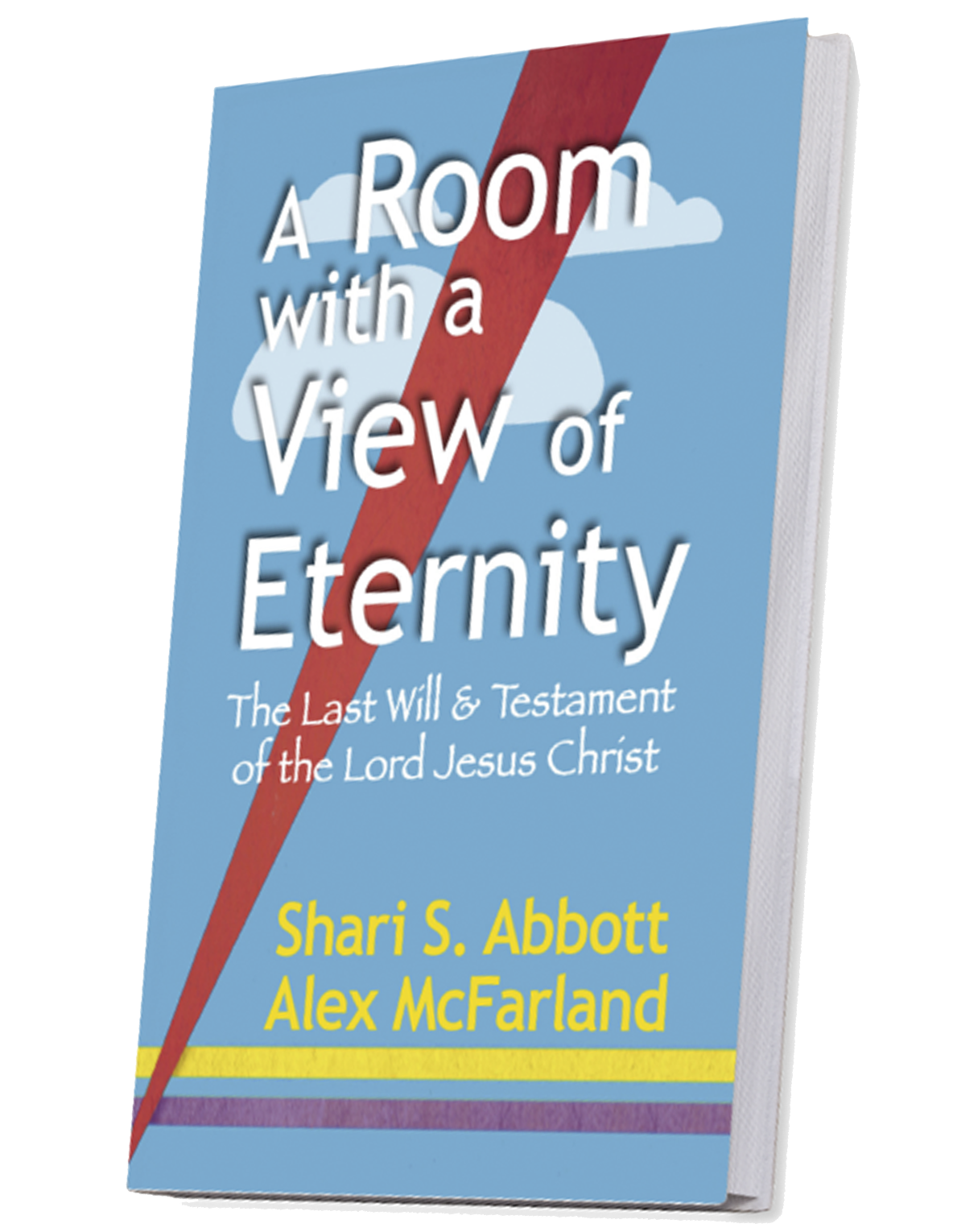 A Room with a View of Eternity—The Last Will & Testament of Jesus Christ Take a seat at the Master's table. Learn about the riches He gives to all who are His. This book will bless and encourage you, give you hope, and help you live in the joy of your salvation and the riches of Christ that are yours.
A Room with a View of Eternity—The Last Will & Testament of Jesus Christ Take a seat at the Master's table. Learn about the riches He gives to all who are His. This book will bless and encourage you, give you hope, and help you live in the joy of your salvation and the riches of Christ that are yours.

The Top Ten Got Questions? in 2023
- The Meaning of NUMBERS in the Bible?
- Was Jesus CRUCIFIED on Wednesday, Thursday, or Friday?
- How was Jesus Like a Worm? What’s the CRIMSON (OR SCARLET) WORM in Psalm 22?
- How are the Shepherd’s ROD and STAFF Different?
- How long did JOB SUFFER?
- What is the Significance of the Wise Men's THREE GIFTS? And were they kings?
- Did The Wise Men Arrive 12 DAYS AFTER JESUS’ BIRTH? Or Was It Much Later?
- Jesus’ Last Days TIMELINE: the Cross and the Resurrection
- The Meaning of COLORS in the Bible?
- Did Jesus Fight Satan to Take Back the KEYS of Death and Hell?
There is much to be learned from those who have gone before us in the faith. Check out our Cloud of Witnesses category that features the words of departed saints who are now with the Lord in glory. Their words equip and encourage us even to this day. Take a few minutes to hear...
- ONLY ONE LIFE, Twill Soon Be Past – by C.T. Studd (1860 – 1931)
- “The Love of God is Greater Far” by Frederick M. Lehman (1917)
- Prayers from Billy Graham
- Who Was Robert Robinson? What’s the Story Behind “Come Thou Fount”
- “Immanuel” — A Poem by Charles Spurgeon (1834-1892)
- Who Am I? A Poem by Deitrich Bonhoeffer (1905-1945)
- Understanding the Everlasting Arms of God, by J.R. Miller (1840–1912)
- 24 Reasons Why I Love America, by John Wayne (1907-1979)
- Give Me Perpetual Broken-heartedness (from The Valley of Vision)
- Abide with Me, by James Smith, 1859
This remains one of our most popular pages viewed.![]()

TOP TEN Videos from Reasons for Hope* Jesus
- Memorial Day BAGPIPES TRIBUTE: Amazing Grace
- RISE AND SHINE and Give God the Glory, Glory!
- WERE YOU THERE When They Crucified My Lord?
- PAUL HARVEY: THE BIRDCAGE
- PRESIDENT RONALD REAGAN: A SOLDIER'S PLEDGE
- Hark! the Herald Angels Sing -- CHARLIE BROWN Christmas
- JOHN WAYNE ~ WHY I LOVE AMERICA
- Jimmy Stewart - Nativity Scene Prayer: Mr. Krueger's Christmas
- THE LEGEND OF THE CANDY CANE - A Christmas Story to Share
- Not by Might, Not by Power, But BY MY SPIRIT says the Lord (Zechariah 4:6)
*****************

